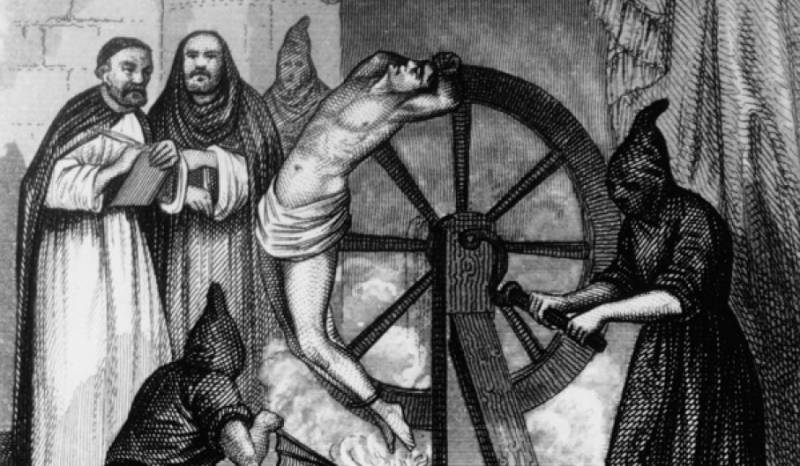
The report is the result of a survey of 71 countries where some form of blasphemy laws exist. USCIRF researchers then measured the severity of these laws and prepared a list. The top two names on the list were of Iran and Pakistan. According to USCIRF, this means that not only the blasphemy laws of these two countries are severe, they are also most likely to be misused and encourage vigilante violence.
But whereas debates about blasphemy laws and the commotions related to them have largely been about certain Muslim-majority countries, present in the USCIRF list are also names of 9 European countries (including Turkey).
This should not come as a surprise. The blasphemy laws in these countries are rather mild compared to those found in Iran, Pakistan and Saudi Arabia. These laws are there more as leftovers of a rather different European past. A past which actually created the whole idea of formulating and then enacting laws against blasphemy.
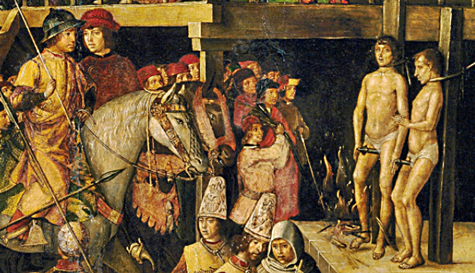
Though France has no such laws and neither does it figure in the USCIRF list, yet it was here that the word blasphemy was first used for a law. According to Olivier Bobineau in his December 2011 article in Le Monde, perhaps the world’s first ever blasphemy laws were enacted by French king, Louis IX when he returned to France after fighting against the Muslims during the Seventh Crusade.

Contemporary depiction of King Louis IX from about 1230
A law had already been passed in the early 13th century, but it was made severe by Louis IX a few years later. Christian ‘heretics’, Jews and Muslims were sorted out, tried and convicted through this law which proscribed the punishment of the mutilation of lips and tongues.
There was no concept of such a law in the Muslim world at the time. The French blasphemy laws were abolished in 1791 after the tumultuous triumph of the French Revolution. According to Larry Wolff, Director of NYU’s Department of European Studies, similar laws appeared in the 16th century in the Venice Republic where tribunals were formed to hear cases of blasphemy against God, Jesus and Mary.
Punishment for committing blasphemy was mainly whipping. Again, even during this period, the 16th century, there were no such laws in the Muslim world.
The last man to be convicted for blasphemy in England was in 1921. He was given a 9-month jail term.
Blasphemy laws were also common in medieval England. In 1400, the religious authorities successfully persuaded King Henry IV to grant them more powers to peruse and punish cases of blasphemy. Between 1414 and 1504, dozens of alleged Christian heretics were tried for committing blasphemy and burnt to death or hanged. The law was made part of British Common Law in the 17th century. But gradually, the proscribed punishments of hanging and burning were replaced with prison terms and fines. The last man to be convicted for blasphemy in England was in 1921. He was given a 9-month jail term.
Even though in 1949 a senior British judge declared that the law was now a ‘dead letter’ and ‘not required anymore’, British authorities had already introduced it in 1927 in their South Asian colonies of India and Burma. It did not carry a death sentence. It was adopted as is by India, Pakistan and Burma in 1947, but only rarely flexed.
The British blasphemy laws had become dormant in the 1940s, but it was in 2008 that the British parliament decided to completely abolish them.

Ghazi Ilm ud-Din
Similar laws also emerged between late 19th and early 20th centuries in Finland, Italy, Sweden, Denmark, Malta, Netherlands, Spain, Norway and Greece. None of them carried the death sentence. In most cases they became dormant, but were only recently abolished in Denmark, Ireland, Netherlands and Malta, and are set to be repealed in Spain. They were decriminalised in Italy in 1999, yet Italy’s rank was 7th in the USCIRF list, the highest for a European country. Interestingly, modern Turkey like France has had a staunch secular constitution. But unlike France, periodical and vague laws have often cropped up in Turkey against blasphemy, but punishments have been lenient.
So if one was to trace the history in this context from the rise of Islam in the 7th century till the early 20th century when Europeans were dominating the proceedings, there is not a single recorded incident where any blasphemy laws were enacted in a Muslim-majority region. Indeed, over the centuries many Islamic theologians debated the concept of blasphemy in Islam, but the Muslim holy book, the Qur’an, though, looks down upon blasphemy, it does not proscribe any punishment for it. It is due to this that blasphemy laws were never enacted in a Muslim-majority region till the early 20th century.
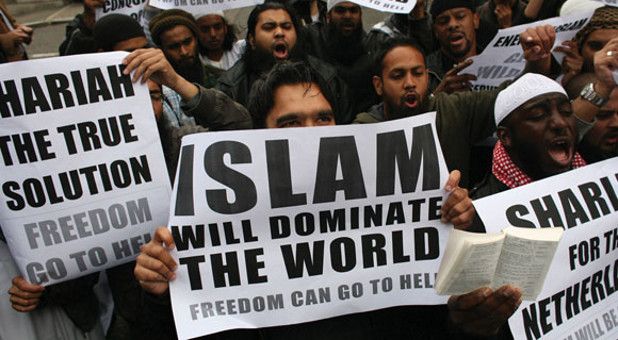
For example, recently when the Supreme Court judges — who acquitted a Pakistani Christian woman who was accused of committing blasphemy — wanted to justify the continuation of the country’s blasphemy laws, they had to use certain musings of some ancient Islamic scholars. There are no punishments proscribed by the Qur’an against blasphemy. But in the pursuit to justify the acquittal, the judges were able to furnish various verses from the Qur’an, Islam’s holiest of texts, spoken by God himself.
Read the judgment here: Asia Bibi acquittal verdict
A majority of such laws emerged in Europe, and thanks mainly to British colonialists, they were exported to India and applied here, apparently to keep a check on vicious theological polemics between the region’s Hindus and Muslims.
But the first such law to appear in a Muslim-majority country was in Saudi Arabia.
Saudi Arabia had come into existence in 1932 with the help of the British. It adopted an ultra-conservative strand of Islam. Saudi laws proscribed death by beheading for blasphemy. It has retained this law till present day and was ranked 11th in the USCIRF list, ironically lower than Italy and 9 other Muslim countries.
Libya enacted a blasphemy law in 1953. It proscribed fines and some years of imprisonment. Interestingly, this was retained across three Libyan periods: Monarchy (which ended in 1969); republican dictatorship (which was toppled in 2011); and even today during a chaotic post-Qaddafi set-up.
Indonesia was the third major Muslim-majority country to enact blasphemy laws. It did so in 1965. The punishment proscribed were a 5-year jail sentence and fines. In 2008, a powerful Islamic lobby made a bid to successfully restrict the activity of the Ahmadiyya in Indonesia. However, the move was not made part of the law and was adopted by just a handful of Indonesia’s provinces. Indonesia is ranked 21st in the USCIRF list.
Afghanistan enacted a law called ‘Crimes Against Religions’ in 1976. But this lapsed during the Soviet-backed government in Kabul between 1978 and 1988. In 1996, the fanatical Taliban regime unleashed a reign of terror, enforcing various laws that proscribed the most brutal death sentences between 1996 and 2001. These lapsed after the fall of the Taliban.
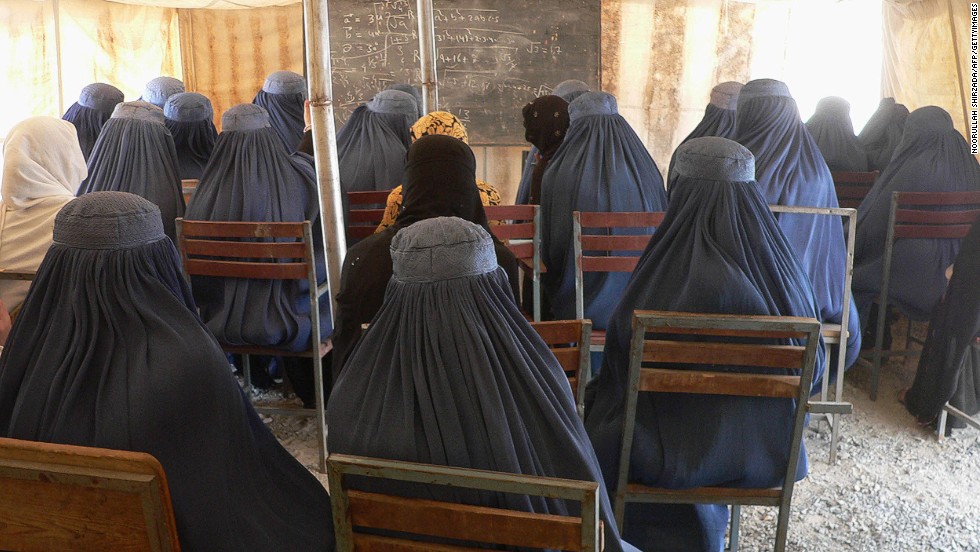
Taliban regime in Afghanistan operated under a fanatical interpretation of Islam
However, with a US-backed ‘democratic’ government at the helm, the ‘Crimes Against Religions’ returned in 2004, but this time it proscribed the death sentence for blasphemy. However, if a convicted person takes back his ‘blasphemous views’ and repents within two days, he or she can be forgiven. Afghanistan is ranked 13th in the USCIRF list.
Pakistan and India adopted the blasphemy laws which the British introduced. They were mild and hardly ever used by both the countries. The punishment proscribed by this law was 1-year imprisonment or a fine. India has continued to retain this law and is ranked 40th in the USCIRF list.
In 1980, after the 1977 reactionary military coup in Pakistan, two more years were added to the punishment for committing blasphemy.
In 1984 a punishment of 3 years imprisonment was added to the law for the Ahmadiyya guilty of preaching Islam or for calling themselves Muslims. They had been constitutionally ousted from the fold of Islam by Pakistan in 1974.
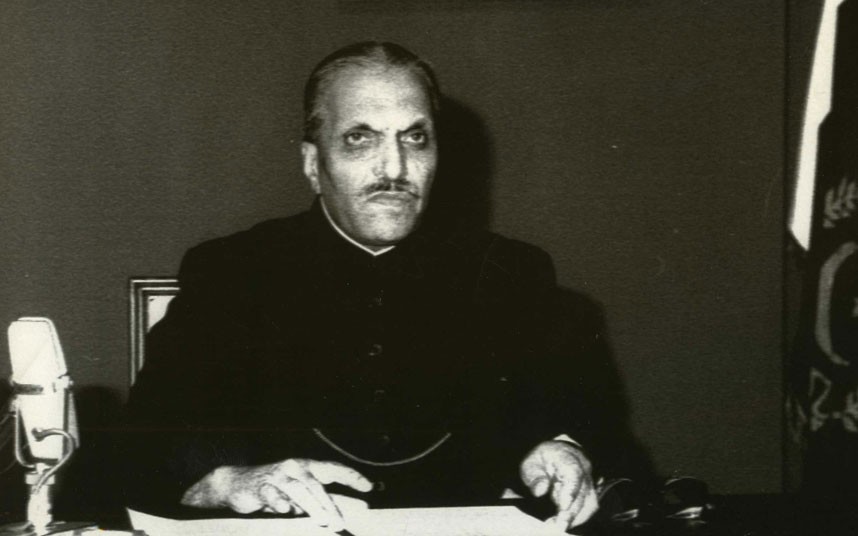
In 1986 the death sentence was added to the blasphemy law through an ordinance. This ordinance lapsed in 1991, but was re-enacted by an elected parliament. Ever since 1991, Pakistan has had the most number of people loitering in jails, facing blasphemy charges. There have also been a large number of incidents in which enraged mobs or individual vigilantes have killed those accused for committing blasphemy. The law does not carry any punishment for false allegations. No wonder then, Pakistan ranks 2nd in the USCIRF list.
Blasphemy laws in Iran came into being right after the 1979 Islamic Revolution there. They proscribed death by hanging or firing squad. Iran still has these laws which are often used against political dissidents. Iran is ranked Number 1 on the USCIRF list.
Egypt enacted a blasphemy law in 1981. Though it does not carry the death sentence, it has often encouraged vigilante acts. Egypt is thus ranked high at 7 by USCIRF. UAE, Qatar, Algeria, Oman, Jordan, Malaysia, Somalia, Sudan, Morocco and Yemen are some other Muslim nations which have blasphemy laws. Among these only blasphemy laws in Yemen and Somalia carry the death sentence. Out of the former communist countries with Muslim majorities in Central Asia and Europe, only one, Kazakhstan, has a blasphemy law. It is ranked 26th by USCIRF. Somalia and Yemen are ranked 3rd and 4th.
